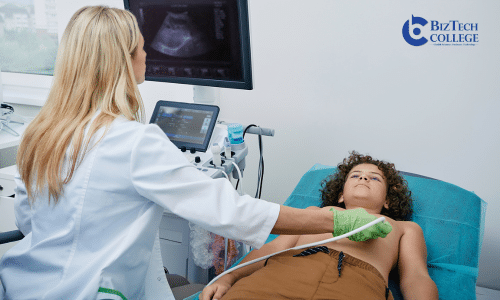For healthcare professionals seeking to advance their careers and play a crucial role in heart health, a diagnostic cardiac sonography program can be an enriching and rewarding path. This comprehensive guide explores essential tips for mastering the art of DCS, specifically geared towards healthcare professionals in Ontario considering enrolling in a heart ultrasound diploma program.
By understanding the program’s scope, key skills required, and practical advice, you can make an informed decision and excel in this specialized field.
Understanding the Cardiac Sonography Program: Curriculum, Eligibility, and Career Opportunities
Healthcare professionals, also known as cardiac sonographers, are skilled healthcare providers who utilize ultrasound technology to capture and analyze images of the heart. This information is vital for cardiologists in diagnosing heart conditions, monitoring treatment progress, and guiding therapeutic interventions.
Firstly, let’s understand the most crucial steps of diagnostic cardiac sonography program…
A. Program Structure and Content
Most diagnostic cardiac sonography programs in Ontario are of 2-year time stamp. They consist of a blend of theoretical knowledge and practical skills, equipping graduates with the expertise to perform comprehensive cardiac sonographic examinations. The curriculum typically covers:
Cardiac anatomy and physiology: Gaining a deep understanding of the heart’s structure, function, and potential pathologies.
Echocardiography principles: Mastering the application of ultrasound technology to visualize the heart, including various imaging techniques and interpretation of results.
Pathophysiology of cardiac conditions: Understanding the underlying causes and mechanisms of various heart diseases.
Patient assessment and communication: Developing skills in patient interaction, history taking, and clear communication of findings to various healthcare professionals.
Clinical skills and laboratory practice: Gaining hands-on experience in operating ultrasound equipment and preparation of CRCS & RDCS certification examinations.
B. Eligibility Requirements
To be eligible for a diagnostic cardiac sonographer program in Ontario, you will typically need to meet the following criteria:
Possess a diploma or degree in a healthcare field such as nursing, respiratory therapy, or related disciplines.
Meet the English language proficiency requirements of the institution.
Demonstrate strong academic performance in relevant science courses (e.g., biology, physics, anatomy).
Possess excellent manual dexterity and hand-eye coordination.
C. Career Opportunities
Upon successful completion of the program and registration with any reputed and accredited college in Ontario, graduates can pursue rewarding careers in various healthcare settings:
Hospitals: Working within cardiology departments, intensive care units, and other departments requiring cardiac sonographic expertise.
Cardiac clinics: Providing diagnostic support to cardiologists in outpatient settings.
Research institutions: Contributing to research projects investigating cardiovascular diseases and advancements in sonographic technology.
Teaching roles: Sharing their knowledge and skills by educating future generations of sonographers.
Mastering Key Skills for Success in Diagnostic Cardiac Sonography
Becoming a proficient cardiac sonographer requires a combination of technical expertise, strong clinical skills, and personal qualities:
Technical Skills: Mastering the operation and maintenance of technologies like ultrasound equipment, applying various imaging techniques, and understanding the nuances of image acquisition and interpretation.
Clinical Skills: Performing comprehensive cardiac sonographic examinations efficiently and safely while maintaining patient comfort and confidentiality. Analyzing sonographic images, identifying abnormalities, and effectively communicating findings to physicians.
Personal Qualities: Possessing excellent attention to detail, critical thinking skills, and the ability to work effectively both independently and as part of a healthcare team. Demonstrating strong communication, interpersonal, and problem-solving skills to navigate diverse clinical situations.
Practical Tips for Excelling in Your Diagnostic Cardiac Sonography Program
Develop strong foundational knowledge: Devote extra time to understanding the underlying anatomy, physiology, and pathophysiology of the heart. This will significantly enhance your comprehension of sonographic findings and interpretation.
Embrace hands-on learning: Actively participate in laboratory sessions and clinical placements. Practice makes perfect, and gaining practical experience is crucial for developing your technical and clinical skills.
Seek mentorship and guidance: Don’t hesitate to seek guidance from instructors, clinical preceptors, or experienced sonographers. Their insights and feedback can be invaluable in identifying your strengths and areas for improvement.
Collaborate with peers: Form study groups, share resources, and discuss concepts with your fellow students. Collaborative learning can enhance your understanding and retention of the material.
Develop strong communication skills: Practice clear and concise communication with patients, physicians, and other healthcare professionals. Effective communication is vital for ensuring patient understanding, accurate documentation, and seamless collaboration within the healthcare team.
Stay updated with advancements: Technology and knowledge in the field of cardiac sonography are constantly evolving. Staying informed through continuing education courses, professional conferences, and accessing relevant research can help you stay current with the latest advancements and best practices in the field.
Conclusion: A Rewarding Path to Making a Difference in Heart Health
So, take the first step today. Enroll in a reputable diagnostic cardiac sonography Program in Ontario, and unlock the doors to a fulfilling career where you can make a tangible impact in the field of cardiovascular health. Your journey awaits—click here to explore accredited program and start shaping your future.

